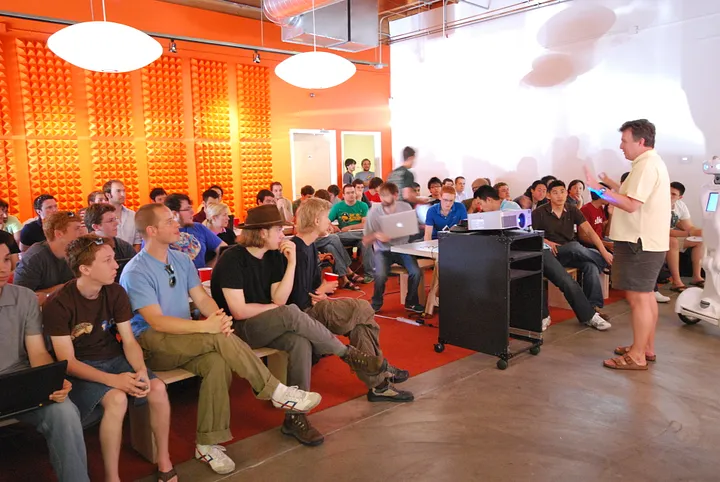The Retail Apocalypse
The “retail apocalypse” is a term that has become quite popular in the media recently, and as a result of this phenomenon, which describes the large-scale closure of retail stores due to a lack of profitability, large retailers have been eagerly looking to transform their practices in order to face growing challenges.
There is an increasing need for retail stores to become more experiential, which would enable them to attract customers to brick-and-mortar locations instead of simply shopping online. An astounding 85% of retail sales happen through brick-and-mortar stores, demonstrating that people still primarily shop in-person, but many retail stores continue to struggle to create the best possible experiences for their customers.
That’s where Mirow comes in.
Meet Mirow – the company transforming the struggling retail industry
Alek Safar, Mirow’s cofounder and CEO, is a serial entrepreneur, and with his cofounders Tim Shamilov and Peter Khkokhlov, he began to explore smart mirrors as a potential solution to the challenges brick-and-mortar stores currently face. He noticed that existing technologies were either too expensive or didn’t provide a confirmed sales uplift. His team decided to take a different approach — their smart mirrors would be both affordable and a highly effective business tool, instead of just being a novelty or something cool to interact with.
A key aspect of the online e-commerce experience is the recommendations that websites provide — Amazon, quite notably, makes 30–35% of its revenue from recommended items. In brick-and-mortar stores, however, this convenient recommendation process does not exist and instead, customers are reliant on sales associates for product suggestions. Now, Mirow’s smart mirrors are able to radically transform the shopping experience, leading to a win-win situation for both customers and retailers.
Here’s how it works. Mirow’s smart mirrors are installed in clothing stores’ fitting rooms. Once a customer is inside a fitting room, a motion sensor is alterted and the smart mirror is able to scan any item’s price tag and look for the different colors and sizes that are available in the store. With the touch of a button, customers can simply request this item and store associates will be notified through a mobile app, after which they will bring the customer’s requested item right to them. Through this seamless process, people can now browse the entire store without having to constantly leave and re-enter the fitting room, making the shopping experience much more convenient. As a result of this improved discovery and recommendations process, Mirow has demonstrated that their smart mirrors directly lead to a sales uplift of 4–8% and increase revenue per customer by 20%, which is highly consequential for the struggling retail industry.
Currently, Mirow is focusing on enterprise customers, since these clients have hundreds of stores that have the proper infrastructure to install and utilize Mirow’s technology. They’re already working with Puma, Quicksilver and Mustang Jeans in the retail space, and are currently expanding into the hospitality vertical through a partnership with Hyatt. Even though Mirow has only recently deployed their mirrors at these locations, a sales uplift is already apparent and customers are satisfied with Mirow’s smart mirrors, which are able to significantly influence how a customer feels about his or her shopping experience.
Mirow’s business model has allowed them to reach a wide range of customers as they’ve made it a priority to stay away from building overly complex technology that either isn’t affordable or won’t be easily adopted by users. Instead, through their unique subscription model, retail stores pay $199/month per mirror, and don’t have to invest in any hardware or pay any expensive upfront fees associated with the hardware. Retailers are now paying as they go, and in effect, are paying for the mirrors through the sales uplift they’ll experience as a result of the mirrors.
Going Forward
As Mirow grows, Alek plans on expanding his smart mirrors to the hospitality industry, where he sees significant potential for Mirow’s technology. Their smart mirrors can be installed in each hotel room, where guests will then have access to a multitude of services through a few simple taps, such as room service, the concierge, or booking a taxi. Although many hotels provide these services through smart TVs, many customers don’t bother ever turning the TV on; with Mirow’s smart mirrors, however, the hotel can guarantee engagement since guests will always use mirrors.
Reflecting on the past three months, Alek and the Mirow team agree that the Quake accelerator program was a great experience; they particularly appreciated the individual focus that was placed on each company. They’ve welcomed the networking opportunities and connections the Quake team has provided them with, but have also found highly valuable the advice and introductions that their fellow cohort companies have given them; the Mirow team has always tried to do the same for their cohort members.
When asked about the retail store of the future, Alek believes that fashion retail stores in particular will become much more experiential, efficient, and will take on a different purpose; instead of stocking lots of inventory, fashion retail stores will become showrooms where customers try on merchandise in-person and then the merchandise is shipped directly to customers’ homes. Smart mirrors and other smart technologies, such as augmented reality, will also help to transform the retail experience Alek says, and here at Quake we’re excited that Mirow is taking the first steps in making this future a reality.
Written by Anjali Agarwal, Junior Associate at Quake Capital


